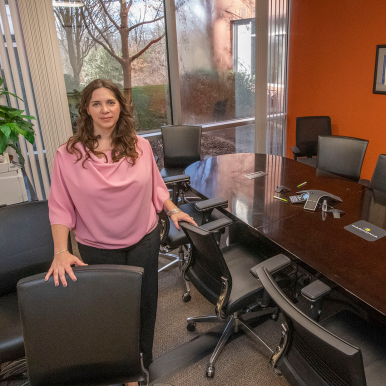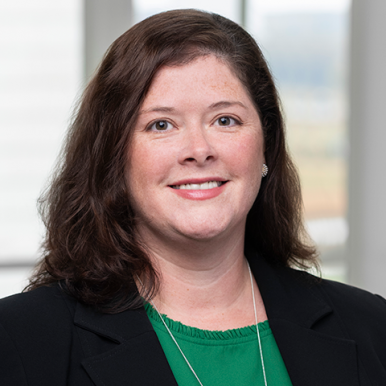A balancing act
Best workplaces grapple with hybrid challenges
Sydney Lake //February 3, 2023//
While there was no way to predict that a global pandemic would disrupt office life as we knew it, one Virginia-based company already had a grip on one trend impacting working professionals. During the COVID-19 pandemic, one in five U.S. households adopted a cat or dog, accounting for about 23 million households, according to a survey by the American Society for the Prevention of Cruelty to Animals (ASPCA).
Charlottesville-based electronics retailer Crutchfield Corp. was already ahead of what’s been called the “puppy boom” of the COVID pandemic. About five years before the onset of COVID, Crutchfield implemented its “pawlicy” allowing dogs onsite at most of its facilities.
For employees headed back to the office who are worried about leaving their new Fido at home, that barrier was already removed. Surrounding its headquarters, Crutchfield has about two miles of woodland trails, which were repaved during the pandemic. But the shining star for employee pet owners is “Woofer Park” dog park, a pun on the name of a part of the car and home audio speakers that Crutchfield specializes in selling. Woofer Park, along with other outdoor spaces, was also freshened up during COVID-19 while employees were working remotely.
“We do seem to have a lot more dogs in the building now than we did,” says Chris Lilley, Crutchfield’s chief human resource officer. “People spend a lot of time on their breaks outside with their dogs, so the dog park’s been really popular.”
Similar to the way many other companies are operating post-pandemic, Crutchfield has employees working hybrid and remote schedules. Crutchfield is taking a more “gentle easing” approach toward reintroducing employees to the office, Lilley says, allowing workers to choose when or whether to come into the office and not forcing workers to do anything they’re not comfortable doing.
No company is truly immune to the new “hybrid workplace conundrum,” as Lilley puts it. Even companies recognized among Virginia’s Best Places to Work have been grappling with how to cultivate and maintain their corporate cultures in a remote or hybrid work environment.
“The workforce has changed over the past two to three years. The expectation now is that work is remote or virtual, so when you tell someone that they have to work onsite, they’re not interested,” says Jason Fair, CEO of Richmond-based Genesis Consulting Partners LLC. “That creates a recruiting challenge in finding the right talent to deliver the high-quality services that we deliver.”

‘Stressbusters’
While a cliché, many best places to work compare their workforce to a family. And similar to the ways that families struggled to stay connected during COVID-19, these organizations also had a tough time maintaining the cultures they’d built up over the years.
While “culture” is an overused word in the corporate world, it’s really about maintaining the personality and character of the company, no matter the work environment, says Tom Tingle, president of Williamsburg-based architecture firm GuernseyTingle. “If you can’t maintain the culture, then it’s just a place to work,” he says. The culture of the 39-year-old firm has developed over time, but it’s a reflection of the people who work there. During the past three years, GuernseyTingle has redefined its work-from-home policy several times, morphing from a 100% remote environment during the height of COVID-19 to a hybrid policy. Today, employees work in the office Monday through Thursday, and have the option to work remotely on Fridays.
“It’s allowed us to get back to having more collaboration and, frankly, more creativity,” Tingle says. “You have more organic discussions around the office over projects and it’s difficult to have that happen [remotely].”
One thing that didn’t stop during COVID-19 was GuernseyTingle’s “stressbusters,” employee get-togethers to blow off steam for a couple of hours.
“When COVID hit and we weren’t able to do that, we really struggled with connecting with folks,” says Kristin Baum, the company’s vice president of human resources. “In the virtual world, it’s just not the same when you’re not seeing everybody every day.”
Stressbusters have included going out for dinner or happy hours and playing games such as pool, darts or simulated golf. But when workers couldn’t get together in person, employees and their families visited an outdoor “drive-through” station at the office to pick up food, hopped on a video call to eat dinner together, played Mad Libs and met each other’s pets from the comfort of their own respective homes.
‘Trial and error’
McLean-based federal IT contracting firm Harmonia Holdings Group LLC wasn’t as worried about maintaining corporate culture as it was concerned with recruiting and acclimating new employees during the pandemic, says Katryn Stewart, Harmonia’s vice president of human resources and administration.
With an array of new hires from as far away as Washington state, Maine and Texas, Harmonia remains primarily remote, so it’s been focused on creating connections with people who can’t physically meet in person.
“I’ll be honest, some of it has been trial and error,” Stewart says. “We’ve always been a very tight-knit organization. When we moved to a remote organization during COVID, we already had a very strong foundation of connection and collaboration, so we really just wanted to keep that going.”
To acquaint employees with the company’s personality, Harmonia has tried out different remote events such as virtual dance competitions. It also implemented monthly all-staff video coffee chats.
But what’s been most successful so far in helping employees feel connected was Harmonia’s “Bring Yourself to Work Day,” which the company first hosted in mid-2022. All employees who were within driving distance of the office were invited to spend a workday at Harmonia’s McLean headquarters.
“This doesn’t sound that exciting up front,” Stewart says, “but keep in mind these are employees who have worked remotely for the last 2 1/2 years.”
Harmonia leadership decked out the office with decorations and massage tables. Employees snacked on rolled ice cream, boba tea and other treats. They also had dibs on any company swag they wanted, including T-shirts, desk lights, pens, notepads and backpacks. More than 150 of the 230 employees living in the area showed up for Harmonia’s first “bring yourself to work” day event, and the company has more of the events planned for 2023.
“Yeah, they were expected to work — it wasn’t a party,” Stewart says. “But it was an opportunity to see each other, to connect, to talk and see how fun it was to be a part of a team face-to-face.”
Flexibility and understanding

The bottom line for workplace success now is flexibility, say representatives from Virginia’s Best Places to Work. While it may have been sparked by the pandemic, it has shifted to become a necessity.
McLean-based financial advisory firm Cassaday & Co. Inc. has long prided itself on being a family-friendly company, and that continues to be a top priority in the post-pandemic era.
At the wealth management firm, work times can be dependent upon stock market hours, but there are also roles that can be done outside of traditional 9-5 work hours, says Allison Felix, Cassaday’s managing partner and chief operating officer.
Much of the company shifted to telework and hybrid schedules amid the pandemic and that hasn’t changed much; employees can telecommute up to three days a week.
“We have a lot of people who like coming in [to the office] more than that, but for those who still desire that level of flexibility, that still exists today,” Felix says.
Cassaday lets employees take out interest-free loans to purchase tech hardware and also lets workers roll over their paid days off, which largely weren’t used as much during the pandemic when people took fewer vacations. Those benefits are particularly attractive for the firm’s younger, single hires, Felix says.
Like Harmonia, Cassaday has held some in-office events to build camaraderie. During the FIFA World Cup in December 2022, Cassaday employees watched World Cup games at the office and chowed down on red-white-and-blue-themed foods.
“It was a great opportunity to return to something that felt like pre-COVID normal and still … ensuring that our staff understand that we’re still looking at them as the whole person,” she says.
No matter the path a company chose to take during the pandemic, there’s no doubt that the nature of work is in flux and will continue to change.
“When we’re seeing folks forcing folks back into offices and onsite full time or part time,” Lilley says, “it seems to be a hammer approach to a problem that requires much more delicate tools.”
r

















